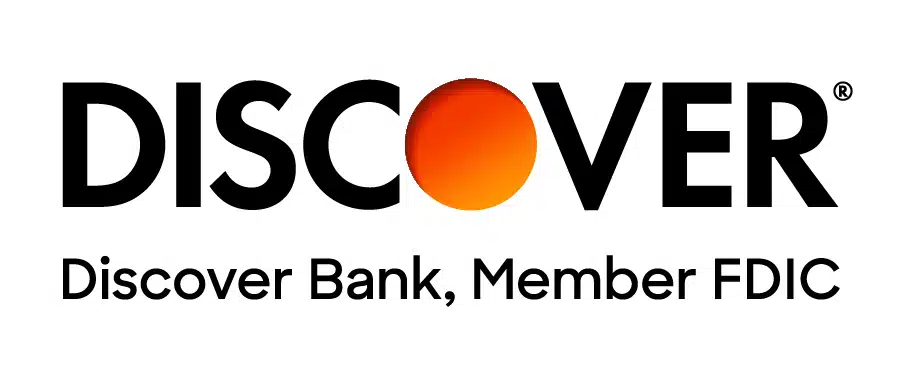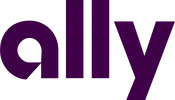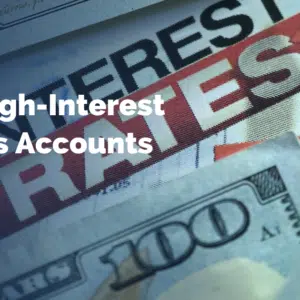I remember a time when the best high-interest savings accounts paid annual yields of over 5%.
Those days were long gone. BUT… they are making a comeback!
According to the FDIC, the national average savings rate is paltry 0.46%. That means that the best high-interest savings accounts today are paying close to 20 times the national average!
Thanks to the low-rate environment, it’s not a surprise that for the past several years, my clients have been griping about how their savings accounts pay next to nothing, even from the best high-interest banks.
As painful as the interest situation is, switching to a top high-interest savings account to stash away some cash for a future financial goal or an unexpected emergency is a high-leverage money move you should make today.
Sneak Peek: Our Top 2 Best Online High Yield Savings Accounts
There are plenty of online banks that offer excellent terms. Don’t let your money sit in a savings account that’s going to be eaten by annual fees. You shouldn’t have to pay to let your money sit.
All the banks on my list are great places to stash your cash. Each can provide different benefits, covered below.
Ready to see current rates? Use our “live rates” tool for the absolute best rates in your area.
Table of Contents
The 7 Best High-Interest Savings Accounts in 2024
1. Discover – Best Overall
2. CIT Bank Savings – Great Ongoing Rates
3. Ally Bank – Best User Experience
4. BBVA Bank – Best Variety of Products
5. HSBC – Consistently High Rates
6. USAA – Best for Military
7. Capital One 360 – Best for Trustworthiness
8. Honorable Mentions
1. Discover Savings – Best Overall (Member, FDIC)
- APY: 4.25%
- Initial Deposit Minimum: $0
Turn Your Savings Into Something
If you’re looking for a bank to invest your savings in to earn very high interest rates, check out Discover Bank, Member, FDIC. The account requires no minimum balance to open and charges no monthly maintenance fees.
It also comes with 24/7 online access to your funds, online transfers to and from other banks, and direct deposits.
As is the case with savings accounts and money markets with all banks, withdrawals and outgoing transfers are limited to no more than six per monthly statement cycle.
2. CIT Bank Savings – Great Ongoing Interest Rates
- Interest Rate: Up to 5.05%
- Initial Deposit Minimum: $100
Make The Smart Choice For Your Savings
CIT Bank is a great choice if you are looking for a bank to store some of your cash for a rainy day.
CIT Bank is in the upper tier of interest rates and is currently ahead of just about everyone else.
On top of their high-interest rate, they also offer a bonus rate tier for customers that have more than $5,000 saved with them.
CIT is also great because of its easy deposits. You can fund your account or add additional deposits via easy online transfer from your current bank, mailing in a check, or wire transfer. Read our full review.
3. Ally Bank – Best User Experience
- APY: 4.25%
- Initial Deposit Minimum: $0
Save Smarter, Faster Than Ever
Ally Bank was built on the premise of getting rid of all the crazy fees that normal banks charge while giving customers great rates and great customer service.
I mean, seriously? How can you not love that? A bank that is fighting to end banks gouging customers will get my vote every time.
Ally also offers a robust set of products ranging from checking and savings to CDs, IRAs, and other investment options.
4. PNC Bank – Best Variety of Products
- Interest Rate: 3.01%
- Initial Deposit Minimum: $25
Creating Opportunities
PNC (formerly BBVA) offers a wide variety of products and services, everything from small business loans to online savings accounts (because that’s why you are here, right?).
BBVA isn’t the most well-known bank on our list; however, they are one of the largest U.S. commercial banks based on deposit market share.
If you haven’t heard of PNC, you should take the time to familiarize yourself with their variety of products.
5. HSBC – High-Interest Rates, Low Minimums
- Interest Rate: 3.45%
- Initial Account minimum: $1
The World’s Local Bank
HSBC offers consistently high-interest rates on its savings accounts. They also offer checking accounts, loans and mortgages, investment and retirement accounts, and insurance.
Here’s what you get with an HSBC high-yield online savings account:
- High Interest. HSBC is dedicated to being competitive on interest rates to attract new clients.
- Low Minimums. $1 to open an online account for all savings, $1 minimum balance to receive APY on Everyday Savings.
- Easy Access. Many of the online banks only let you do transfers.
6. USAA – Best for Military
- Initial Minimum Deposit: $25
We Know What It Means To Serve
*You must have a family member who is serving/has served in a branch of the military.
Aside from being an exceptionally reputable organization, as an online savings account, USAA offers several unique benefits that the other banks on this list don’t. You can get a HUGE variety of different products with USAA.
They offer just about any financial or insurance product you could ever need, and having all of your accounts and products in one place is an impressive advantage.
Here’s what you get with a USAA online savings account:
- Free Access to Virtually Any ATM. No fees for withdrawals at more than 60,000 “USAA-preferred” ATMs. They will also refund you the fees of any ATM that isn’t one of the preferred machines.
- Low Initial Deposit. Similar to some of the other accounts, USAA does require an initial deposit, but it’s only $25.
- No Fees. With a USAA savings account, you will not have any service fees or any fees if you transfer money to another bank.
If you have a family member who has ever served in the military, it’s worth checking out an online savings account with USAA.
7. Capital One 360 Savings Account – Trustworthy
- Initial Minimum Deposit: $1
What’s In Your Wallet?
I’ve had an account with Capital One 360 Savings longer than I have with Ally. That’s because Capital One 360 (formerly ING Direct) was one of the first reputable online banks to exist.
Capital One 360 is easy to use and secure, and you can connect your account to your other accounts, including your Capital One Investing account.
Here’s What You Get With Capital One 360:
- Extremely Competitive Interest Rates.
- No Minimums. Like Ally, you won’t be hit with any minimum balance fees, and you can open an account with as little as $1.
- Easy Deposit Options. Opening an account is easy — you just link a checking account from another institution like you would with any national bank.
- Easy Access and Management. Capital One 360’s user interface is one of the best around. One of the unique things Capital One 360 offers is “sub-accounts,” where you can open up mini-accounts to hold your saving goal money.
So you can have a main Savings Account but have mini-accounts for Vacation Fund, Emergency Fund, and so on.
- Other Account Options. They offer a robust set of accounts ranging from checking to savings to CDs, mortgages, and investing.
High-Interest Online Savings Accounts – Honorable Mentions
Oportun (Formerly Digit.co) – A New Option
Another interesting savings option is Digit.co (Digit.co was acquired by Oportun in 2021)
This is a bank that uses an algorithm to determine how much money to transfer from your checking account into savings every few days. By tracking your income and spending habits, Oportun can determine how much extra money should be going into savings.
Oportun promises that its automatic transfers won’t overdraw your account. The interest paid is very small, but it does exist. This is an account for people who want to save without needing to think about it.
Getting access to your money is easy; it’s all done through text. You text simple commands to change how much you save, to check your balance, and to withdraw to your own account.
American Express High-Yield Savings Account
- Minimum Balance: $0
Do Not Live Life Without It
American Express, the credit card company that offers fantastic cashback, now has a banking arm that offers great interest on your account.
Rates are currently very competitive with some of the larger, well-known online banks. Account access is not as sophisticated as you see with other banks, but you don’t need that sophistication if you are just looking for a solid place to keep some of your cash.
If American Express Savings offered a full suite of financial products like mortgages and checking accounts on top of the savings account and CD, I would be more concerned about the website.
But this is a pretty basic product: deposit money, earn interest, and watch it grow.
AMEX also has a 36-month CD that you can drop your money into to earn a slightly higher rate of return. However, the difference is so small that I can’t recommend locking your funds up for 3 years.
Here’s what you get with AMEX’s High Yield Savings Account:
- Great Interest. To attract customers, American Express often has some of the highest interest rates available.
- Simple Options. You have two account options: high-yield savings and a certificate of deposit. Two simple choices rather than an array of confusing options.
- No Minimums. You don’t have a minimum balance requirement, and you don’t get hit with a fee for letting your balance get too low.
TIAA Bank – Great First-Year Interest Rates
TIAA Bank is one of the longest-standing online banks and consistently has some of the best introductory interest rates. Currently, their money market account is offering 4.75% for the first year. This gives them one of the strongest savings rates in the industry.
Here’s what you get with a TIAA online high-yield savings account:
- $5,000 Minimum Initial Deposit
- No Monthly Fees
- Basic Savings, CDs, and Checking Accounts Available
If you are looking for a solution to get competitive one-year interest rates, then TIAA Bank will be a good option for your needs.
Why You Need a High-Interest Savings Account
With so many options for storing your money and the low interest rates, a lot of my clients ask, “Why do I even need a savings account?” and honestly, that’s a great question.
The first reason is the obvious one – you get a slightly higher interest rate, and earning a little interest is better than no interest, right? But the interest you earn isn’t the only reason to find a good online savings account.
The other reason is a little more obvious: it forces you to save that money. Federal regulations limit the number of times that you can withdraw money from your account. If you can’t keep taking money out of the account, it’s going to encourage you to save.
There are hundreds of thousands of places where you can open up a savings account, but all of them basically break down into three categories: traditional savings accounts, online savings accounts, and kids savings accounts.
Many of these also offer a money market. If the MMA account offers a higher interest rate, then we will list that instead of the savings account option.
Saving for future purchases and expenses is one of the best things you can do to stabilize your financial situation.
Rather than using credit spending (and winding up in debt if you don’t pay off the balance each month), identifying your spending goals and saving up can help you buy the things you want — without ruining your financial future.
You should also understand that keeping an emergency fund available for a rainy day can be a good idea. What happens when the car needs repairs, or you need to replace the dryer? An emergency fund can protect you from the need to borrow in order to meet these unexpected expenses.
While a high-yield account would be nice, it’s important to recognize that your savings account isn’t meant to help you build wealth so you can fund your retirement (learn more about investing for retirement through a Roth IRA).
Rather than expecting high yields from your savings account, here’s how to think about it:
Liquidity
One of the biggest advantages of a savings account is liquidity. Because it’s cash, it’s instantly available for you to use. You don’t have to sell shares and what for the proceeds of the sale or jump through hoops to get your money. It’s available immediately.
This is what makes savings accounts ideal for an emergency fund. You know you can get to the money immediately if you need it. The liquidity also makes it great for accessing your money for a short-term investment goal.
You know that you will be able to pay with your savings account when you need to, or you can use the money to instantly pay off your credit card after you’ve used it to book your vacation (and earn points).
Safety
The other reason to incorporate a savings account into your financial strategy is so that you can keep the money safe. You don’t have to worry about losing your vacation money in the stock market when you keep it in a savings account.
You know the money is there when you need it for an emergency with your savings account. Plus, if your account is with a federally insured institution, you don’t have to worry about losing your money if the bank fails.
Savings Account Purpose:
Stop thinking of your savings account as a place to help you grow your wealth, and instead think of it as a way for you to protect your assets and keep your long-term financial situation from deteriorating due to debt.
You can also think of your savings account as a way to help you save for short-term goals. As long as you incorporate a savings strategy along with an investing strategy that allows you to build wealth over time, you should have a balanced approach to your overall financial plan.
Whether you are saving up an emergency fund or just preparing to spend money on a nice vacation next year, you need a great savings account to hold your money.
What to Look For in an Online Savings Account
There’s no need to let your money sit in an account that doesn’t pay any interest at all. That’s one of the worst things you can do with your money because the value of your money will slowly go down due to inflation.
You need to generate some interest to combat inflation just to maintain the spending power of the money you have. However, even a high-yield savings account is unlikely to beat inflation.
Then again, interest isn’t everything. There are other considerations as well when choosing from among the top savings accounts.
Interest – High Yield
For me, interest comes first. Generating interest helps protect your money from inflation. Even if inflation is really low, getting some small interest on the side will help you bolster your account over time.
Interest isn’t the only important factor, but it never hurts to have someone paying you to store your cash with them.
Don’t get too caught up in chasing yields, however. Most of the time, the difference between accounts isn’t enough to prompt you to move your money every time a bank comes out with a newer, higher yield.
Customer Service
Having great customer service is another key aspect of a great savings account. If you earn a little bit more interest at one bank, but the customer service is awful, you will probably regret it. I like to stick to firms that have solid reputations or that I’ve had previous experience with.
The accounts on this list all offer good customer service and a good user experience.
Access
You want easy access to your funds. If you have to jump through a lot of hoops to pull money out of your emergency fund during an unexpected setback, it defeats the purpose. Other considerations when you look at savings account access:
Do you have to go to a physical branch? Or can you transfer funds online using your smartphone? What about ATM access?
Can you withdraw money at ATMs across the country for free, or at least get reimbursed for the fees you do pay? Access can be a tiebreaker when you are comparing two very similar banks.
Types of Savings Accounts
There are a few different types of savings accounts, but don’t worry; the main idea is still the same.
Bank Savings Accounts
This is the traditional idea of a savings account at a physical bank. You can walk into any local branch of a bank and open up one of these savings accounts. Normally, these accounts have maintenance fees and low-interest rates.
Online Savings Accounts
These accounts work almost identically to a traditional savings account, except you manage the whole account strictly online. In most cases, online savings accounts offer slightly better interest rates because they have lower overhead costs.
Savings Account for the Kids
Maybe you want to open up a savings account for your kids; that’s a very good idea! Some banks have savings accounts specifically designed for kids, but don’t worry; you’ll have control over the account. It’s a great way to teach your children about managing money.
| TYPE OF SAVINGS ACCOUNT | DESCRIPTION | PROS | CONS |
|---|---|---|---|
| Regular Savings Account | A Basic Savings Account Offered by Banks and Credit Unions | Easy to Open and Maintain, Low Minimum Balance Requirements | Low Interest Rates |
| High Yield Savings Account | A Savings Account That Offers a Higher Interest Rate Than Regular Savings Accounts | Higher Potential for Interest Earnings, Easy Access to Funds | May Require a High Minimum Balance or Have Restrictions on Withdrawals |
| Money Market Account | A Type of Savings Account That Typically Offers Higher Interest Rates Than Regular Savings Accounts and May Include Limited Check-Writing and ATM Access | Higher Potential for Interest Earnings, Check-Writing Privileges | Higher Minimum Balance Requirements and Fees |
| Certificate of Deposit (CD) | A Savings Account That Requires You to Deposit a Fixed Amount of Money for a Set Period of Time, Typically Offering Higher Interest Rates Than Regular Savings Accounts | Guaranteed Interest Rate, Fixed Term With No Early Withdrawal Penalties | Limited Access to Funds, Higher Minimum Deposit Requirements |
The Bottom Line – Finding the Best High-Interest Savings Accounts
What’s more exciting than online savings accounts these days? Not much, as online banking has revolutionized the market and brings convenience, security, and higher rates of interest.
Gone are the days when leaving your money in a passbook account was the only real viable option – now you can find some of the best high-yield savings accounts online, meaning you could be well on your way to achieving your financial goals in no time at all.
Researching online has never been easier or more rewarding!













Great post…Very resourceful and I used info to help me in my decision on which bank to go with
What do you recommend for a non-profit seeking to 1) protect its reserves and 2) earn a little interest while it sits there?
Hi Stacy – Since you’re a non-profit, you don’t want to risk any loss of money. Go with a high yield account at an online bank that offers accounts to non-profits. Earning interest is less important than protecting the money, but you might be able to get a decent return anyway.
You forgot to mention Dollar Savings Direct saving account 1.60% interest rate!
Looks like a good deal too Sue. But we kept the list to banks we’re familiar with. I’ve never heard of Dollar Savings Direct.
Great info. I am with USAA and it’s a great company but not competitive in many areas…agree their biggest asset is one stop shopping which is convenient for the traveling military but at a cost. their savings account returns are terrible (0.3%) including the money mkt rate of return in their brokerage acct of only 0.17%.
This post will probably get a lot of love if and when interest rates get back to a higher and more normal level. I’ve had a good experience with 360 but don’t like having all my edges in one basket so it’s timely reading this.
I do like a good sign up bonus so Chase looks like the early favorite.
Good info. What’s crazy is that, these days, it looks like people are using the stock market as their ability to earn a return on their money whereas in the past a savings account would have paid pretty well. This is working now with things going up all the time, but if they don’t keep going up (and they won’t), this is a dangerous game.
First Foundation Bank in California, online national high yield savings account rate is 1.20%, minimum dep: 1k / atm access / FDIC insured.
I like Bank of America simply because of the Yodlee aggregation/budgeting tool (moved there when Citibank dropped Yodlee).
What I love about ING direct/CapitolOne 360 is the availability of multiple savings accounts – I’m using them as virtual ‘envelopes’ and budgeting that way.
Do you have any recommendations on banks, online or otherwise, for starting a small business account?
Thanks for this. I am looking for a place to store our money while we save for a down payment on a house. I’ll look into Ally and ING.
This is great list. The post came just in time as I am looking into opening a Discover CD. Thank you for sharing!
The bank most bloggers seem to recommend is ING Direct. So far, I’ve stuck with local banks that I can call up or drop in and talk to someone at. Eventually a high yield ‘online’ account might prove useful.